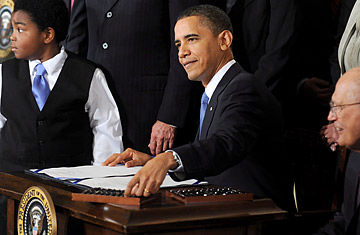
President Barack Obama signs the health care reform bill at the White House on March 23, 2010
The health-insurance industry, which spent months campaigning against Democratic health reform, has shifted focus in the wake of its passage, pivoting from opposition to making sure the new law succeeds beyond most expectations.
America's Health Insurance Plans (AHIP), the industry trade group, has agreed to sign on to a new, 50-state health care reform implementation effort, provisionally called Enroll America, which is being organized by Ron Pollack of the pro-reform group Families USA. "We are participating in it," says AHIP spokesman Robert Zirkelbach. "The goal is to get everyone covered."
Other parts of the health industry, including drug companies and hospitals, are also expected to join the effort, which will focus on making sure as many uninsured Americans as possible get insurance under the law President Obama signed Tuesday. "We are literally going to try to raise tens of millions of dollars per year for the next several years, beyond 2014 when most of these things get implemented," says Pollack. He says he plans to meet Wednesday with Karen Ignagni, the head of AHIP, to discuss the involvement of insurance companies.
The Congressional Budget office estimates that 95% of legal Americans will have health insurance after the law is fully implemented by 2016, adding approximately 32 million previously uninsured people to the health-coverage rolls. Health insurers have long argued for tougher government mandates that would require more of those who are generally healthy to get health insurance, which helps spread the risk in the pool of insured.
Enroll America will focus on enticing the final 5% of Americans who will be eligible for health insurance under the new law but whom congressional budget scorers do not expect to enroll. On a state-by-state basis, the group will work to create an easy application process for benefits, including access to enrollment at doctors' offices, pharmacies and government agencies that provide other benefits like food stamps. "All of these groups have a business reason to do this," says Pollack, who notes that his new coalition would include "many groups that don't really see eye to eye."
Enroll America won't be the only outside group working to sell health-insurance reform in the coming months. A coalition of labor and other progressive interest groups plans to launch its own outside effort to educate voters about the benefits of the new reform law in advance of November elections. "If we can teach the public what's in it, it can help trump the politics of repeal," says one person involved in this effort, which is likely to work with Anita Dunn, who resigned as White House communications director in December. "We need to build a political case for health care reform over the next 10 months."
PhRMA, the drug industry's trade group, is also expected by progressive activists to continue public education spending over the coming months, though the organization's board has not yet made any final decisions. The group has already spent tens of millions of dollars in recent months on ads promoting health reform.
While conservative groups and Republican politicians will surely continue advertising and organizing against the health-reform law, Families USA also plans to launch its own public education campaign, funded through foundation donations, over the coming months. It will include a "health-reform road show" across the country, which will seek to drum up local press coverage of the new law's benefits, says Pollack. The organization is also planning to release state-by-state studies of the number of beneficiaries from key parts of the law, like the new protections for patients with pre-existing conditions.
Individual insurance companies also plan to launch education efforts for their existing customers about the benefits provided by the new law. "Our top priority is to minimize disruption for the 200 million people we serve today," says AHIP's Zirkelbach.
